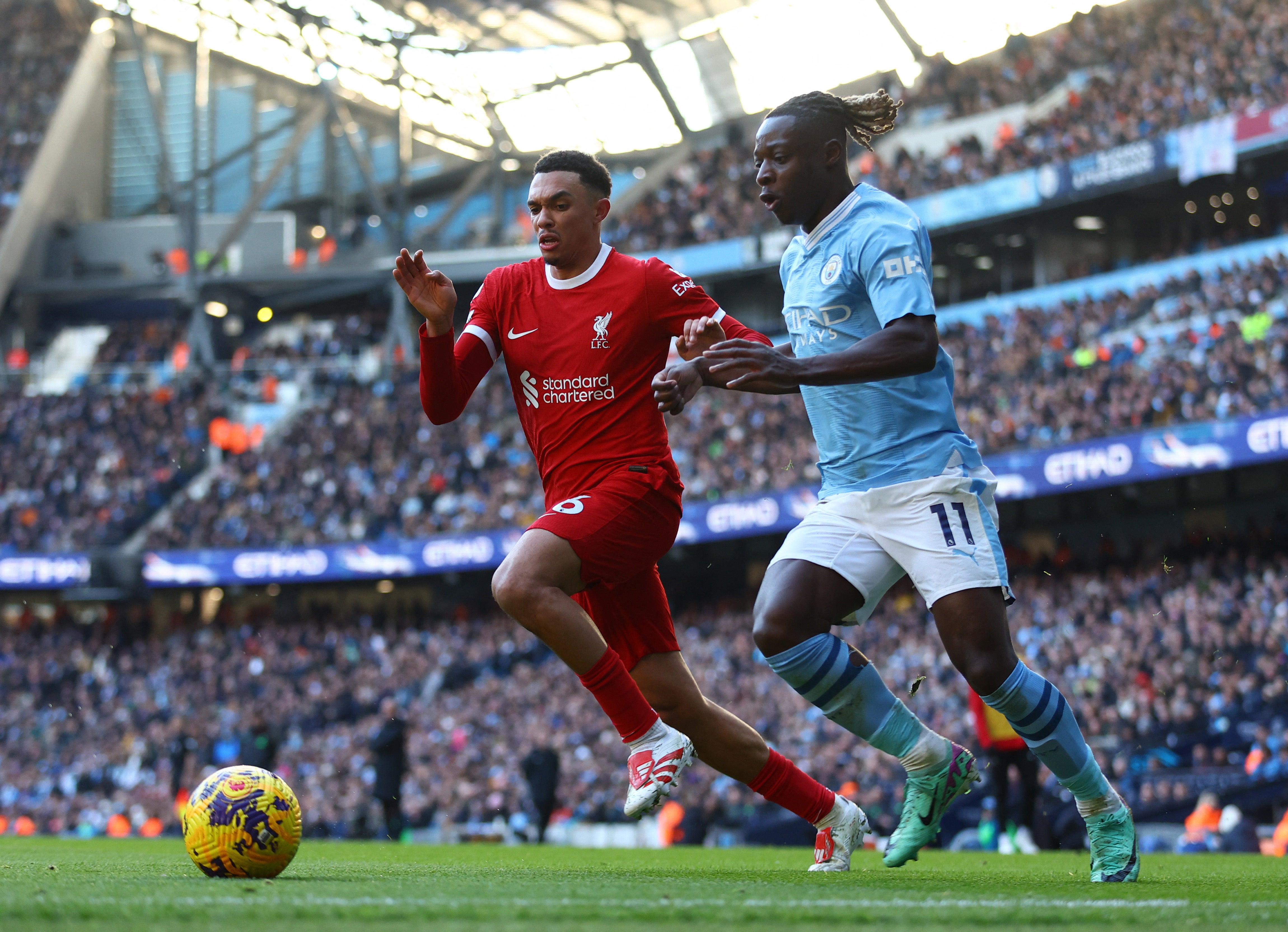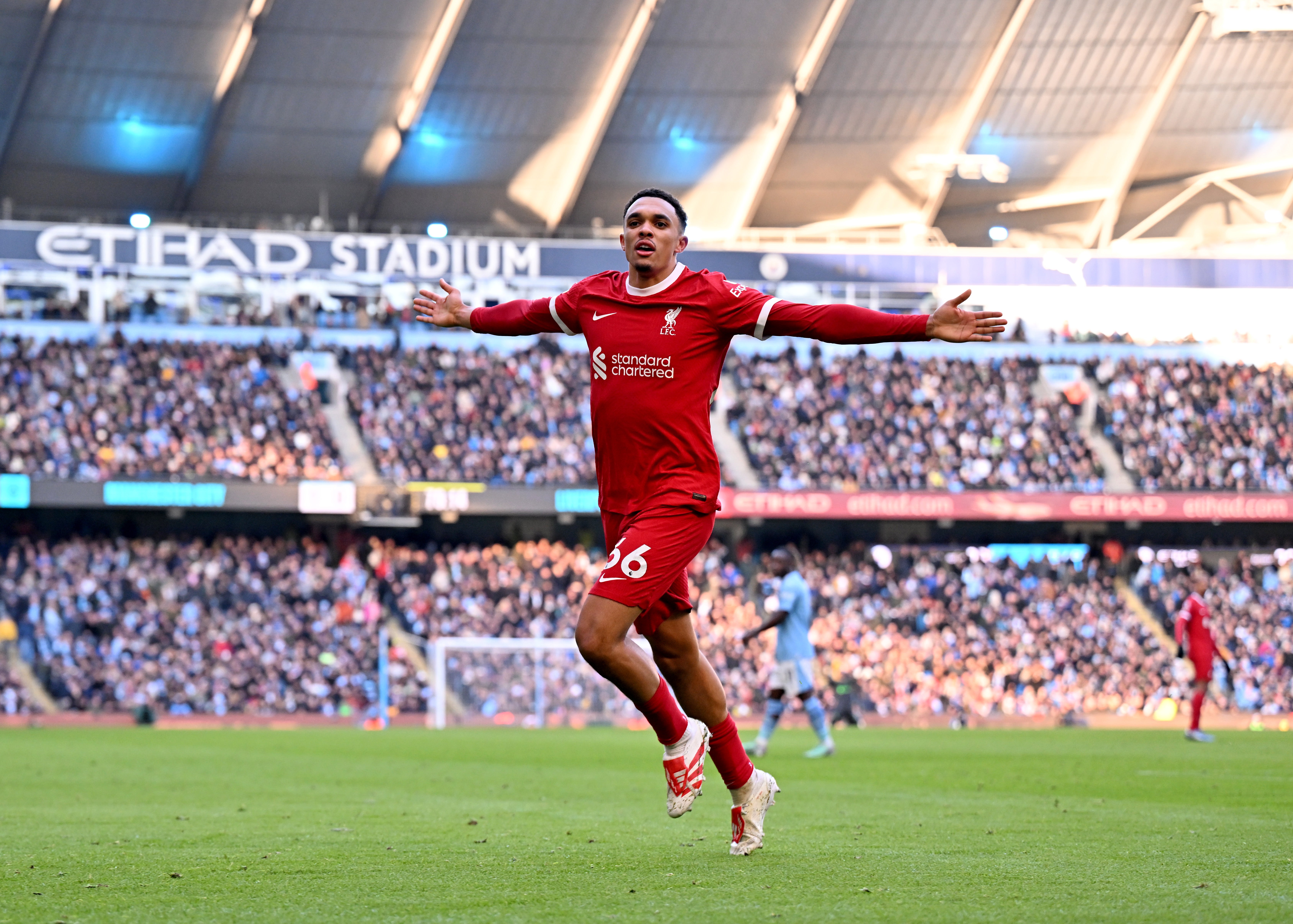Trent Alexander-Arnold’s impact against Man City wasn’t just the one you see in highlights
Sign up to Miguel Delaney’s Reading the Game newsletter sent straight to your inbox for free
Sign up to Miguel’s Delaney’s free weekly newsletter
Thanks for signing up to the
Football email
Perhaps this was another hint, another example, another reason why Trent Alexander-Arnold seems to both want to play further up and why, eventually, he must.
The early knockings of this fixture looked like it might be about who performed the switching six role better: the Liverpool man from right-back as usual, or Manchester City’s central defender Manuel Akanji, stepping forward to sit alongside Rodri. That rotation of position has become commonplace for both teams and continued here, albeit in different ways, and hinted that it might be a decisive factor early on.
But it wasn’t; not really, not for a vast majority of the game. Until it was, and Alexander-Arnold secured a 1-1 draw with his late, bottom corner strike.
On the one hand, the attacking technique, the precision, the increased proficiency in the final third and in open play, all show why there have long been calls for the No.66 to be deployed in a more advanced role. It’s why that’s where Gareth Southgate has finally found a way to get Alexander-Arnold into the England team, and it’s why this alteration was ultimately landed upon by Jurgen Klopp and his coaches last term, when the old approach fell so badly short. One of those assistants, Pepijn Lijnders, was a driving force behind the switch to this system of pushing one defender into midfield, having utilised Alexander-Arnold at the base of his own centre of the park when in charge of the Reds’ youth teams several years ago.
But on the other hand, too many quickdraw conclusions about pushing Alexander-Arnold forward as a consequence of a single goal will doubtless have Klopp pointing out the remainder of this match, a game where he did still play right-back and did still contribute to a very disciplined, highly deliberate performance to contain Man City.
Defensively, he wasn’t perfect. That’s a hard thing to attain against anyone, let alone the European champions. Alexander-Arnold – along with Kostas Tsimikas and Dominik Szoboszlai, plus Alisson’s kicked clearance in the first place – were all culpable in City’s opener. They made it far too easy for Nathan Ake to waltz through unchallenged and play in Erling Haaland to score.
So too is it true that Alexander-Arnold faced a tough time in keeping track of Jeremy Doku’s continual chop-backs, close control and dribbles. While he didn’t stop anywhere near all of those individual moments in City’s attacking play, he did hold the Belgian off at times, made a couple of vital tackles and followed the team plan of doubling up on the inside. Additionally, he made a big challenge to clear from inside the six-yard box in the first half with Haaland lurking, and defended his post well in the final knockings of the game as City sought a late winner.
Winning possession nine times across the course of the game put Alexander-Arnold top of that particular defensive cover-all metric.
No defender made more than his three tackles; no player on either side in any position made more than his two interceptions. It all adds up to show he more than played his part in a resolute showing, with Joel Matip alongside him outstanding, Virgil van Dijk continuing his recent excellent form and Kostas Tsimikas also improving on the left.
Perhaps it’s as well for Liverpool that the back four were near pitch-perfect, given that behind them, Alisson was erratic and fortunate with a series of misplaced passes and one dropped corner, ruled as a foul as Ruben Dias thought he had scored.
Alexander-Arnold was far more withdrawn, far less adventurous even when drifting infield to pair up with Alexis Mac Allister. He roved forward down the flank just twice in the first half; delivering a cross, winning a corner.
Liverpool didn’t over-commit. They waited, they probed, they let Darwin Nunez create moments of possibility. And, as time began to run down, Alexander-Arnold it was who finally surged through from deep, finally got himself on the ball in a dangerous, central part of the final third – and who took a fine first touch from Mohamed Salah’s pass, and an even better second touch to score.
A low, angled drive past Ederson into the bottom corner gave him a first goal of the season to go with three assists in all competitions. While not an outrageous tally yet by his own creative standards, he has already been disrupted by injury and needed a few games back on the pitch to hit top speed.
There’s unquestionably more to come from Alexander-Arnold in an attacking capacity and he might yet become a vital man in the middle. But as he showed at the Etihad, the hardest ground Liverpool or any other team will go to this year, he still has a big part to play in the Reds’ defensive gameplan too – without stopping him shining at the other end.
Source: Read Full Article


